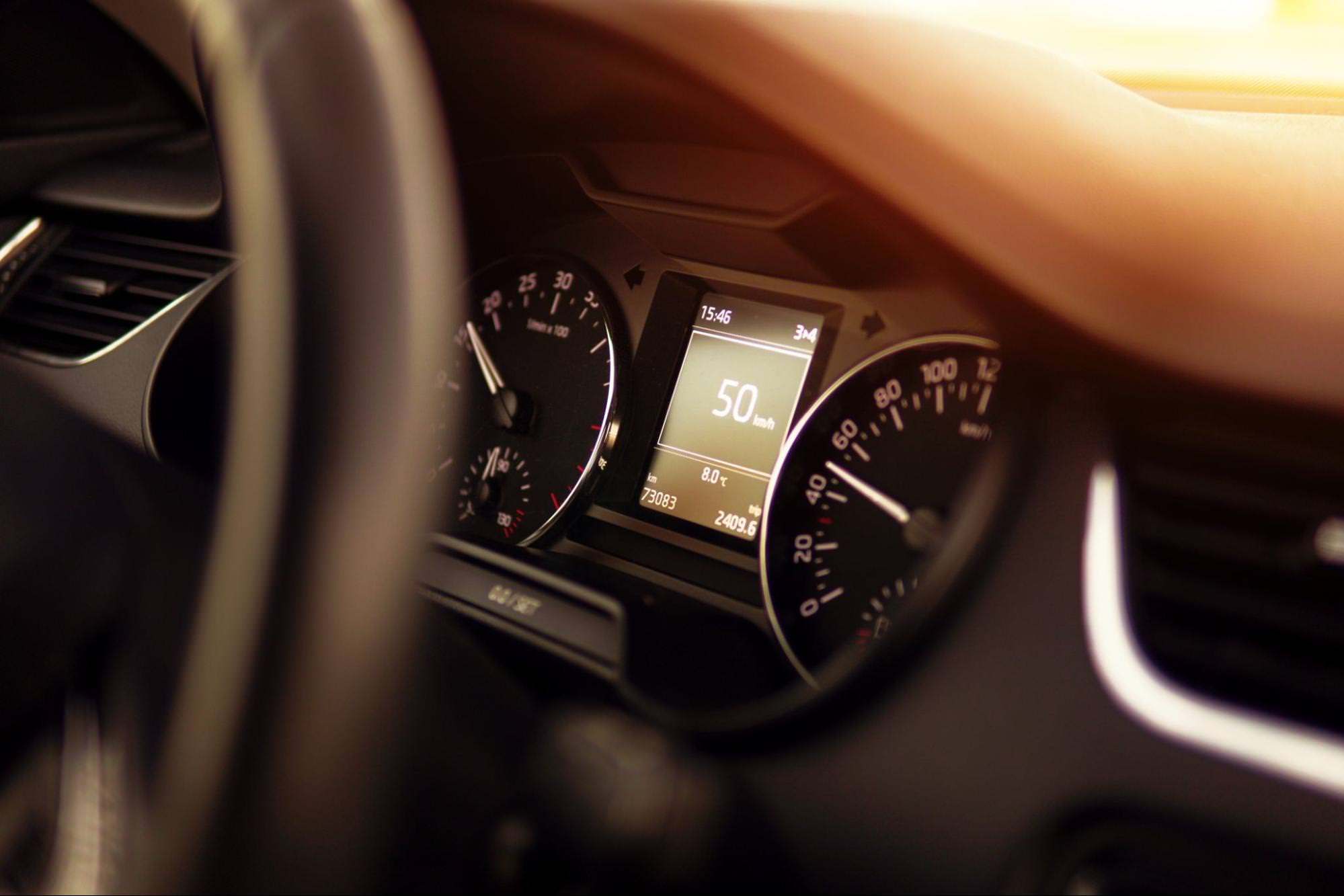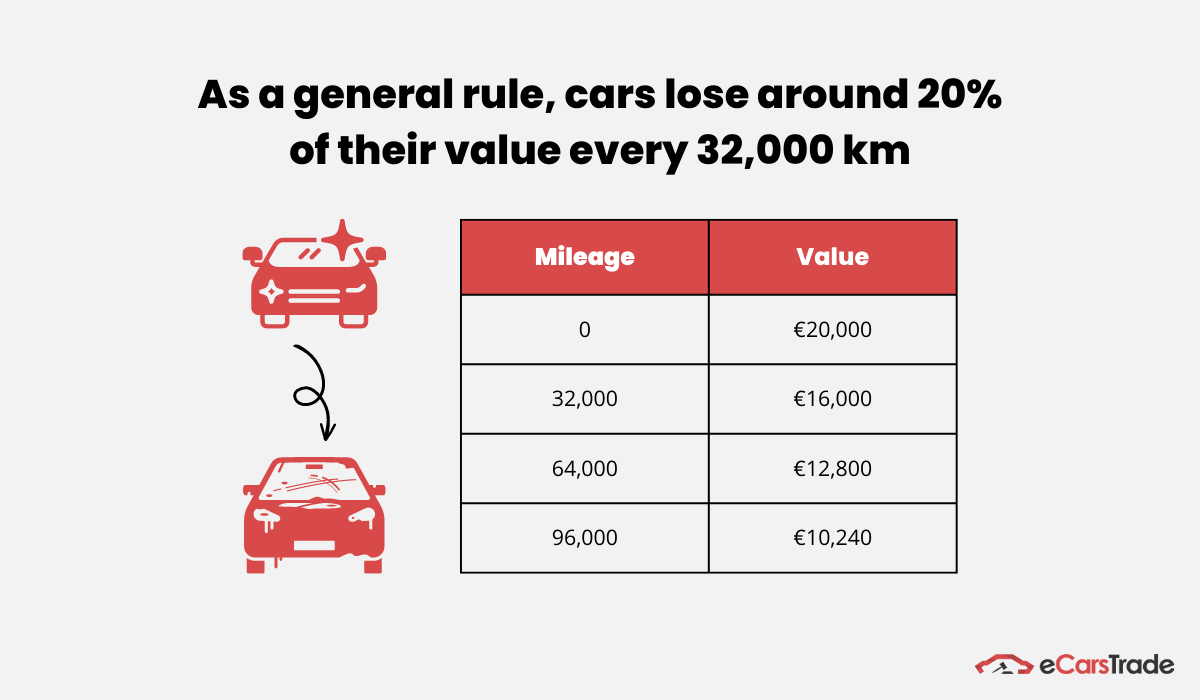- Blog
- What Is Good Mileage for a Used Car?
What Is Good Mileage for a Used Car?
Make sure you’re getting your money’s worth when buying a used car with our guide to mileage and other indicators of car condition.

So you’ve decided to buy a used car. One of the first questions you’ll likely be asking yourself is how many kilometers it has on its odometer. Why? Because the answer to this question will likely tell you if the car is in good condition and forecast how long you’ll be able to use it.
But are things really that simple? As you’ll be able to see in this article, “good mileage” can be a very abstract concept and there are a lot of other factors you need to consider to make it certain you’re making the right purchase.
Read on to find out how to treat used car mileage when making a purchasing decision and what other information you need to ensure you’re really getting your money’s worth.
Understanding mileage: why does it matter?
Car mileage is a relatively simple concept: it refers to the number of miles/kilometers a car has traveled since it was manufactured. However, this small piece of information is actually an indicator of the general condition of the vehicle you’re planning on buying.
Generally speaking, used cars with a higher mileage have a chance of showing signs of wear and tear, which can lead to higher maintenance costs. But, some car brands are incredibly resilient and remain loyal companions to their owners for a very long period of time.
Calculating a car's value based on depreciation by mileage
Nevertheless, used cars with mileage on their odometers come at a lower price, an important consideration for buyers. In other words, a smart buyer can choose a used vehicle that’s going to serve them well for years to come at a really good price.
In fact, as a general rule, cars are said to lose a fifth of their value after every 32,000 km. Here’s an example calculation to illustrate this depreciation:

Illustration: eCarsTrade / Data: CarWow
All of this means that used car mileage is one of the first things you should be looking at when you’re making your purchasing decision.
But that’s not the whole story. There are actually mileage benchmarks you can rely on to tell you if a car’s mileage is in accordance with its age. In addition to that, considering some other factors can provide you with more valuable insights on the car's condition and tell you if you’re really getting your money’s worth.
More on that in the following sections, but for now let’s say that the question “what’s good mileage for a used car” is more tricky to answer than it might seem at first glance.
Average mileage for different types of used cars
If you’re in the market for a used vehicle and want to ensure you’re buying something with good mileage (and, therefore, less wear and tear as we mentioned in the previous section), you’re probably wondering if there are any benchmarks you could rely on to help you make the right purchase.
In other words, you’re asking the question, “what is a reasonable or average mileage for a car this age?”.
The good news is that there is an answer to this question. The bad news is that the figure isn’t very reliable. But let’s review it anyway.
What is the average mileage based on a car's age?
The average car travels around 20,000km every year.
To calculate a reasonable mileage for a used car, use the following formula: 20,000km x car age in years.
So, for example, if you’re looking at a five-year-old car, it’s reasonable to expect that this car will have somewhere between 80,000 and 100,000 km on its odometer. If that’s the case, that means the car probably wasn’t overused.
If it has traveled more than that, you might be looking at increased maintenance and a shorter lifespan as its new owner. If the odometer shows less than 80,000 km, then you might have stumbled upon a good find (mileage-wise, at least).
| AGE OF VEHICLE | AVERAGE MILEAGE |
|---|---|
| 1 year | 16,000–24,000 km |
| 2 years | 32,000–48,000 km |
| 3 years | 48,000–72,000 km |
| 4 years | 64,000–96,000 km |
| 5 years | 80,000–120,000 km |
This seems straightforward, so why are we saying that this average figure isn’t a reliable benchmark? Well, because different types of cars are used in different ways.
For example, commuter and family vehicles often have a much higher mileage than this benchmark. Traveling to and from work every day, driving the kids to school, going on family vacations - all of this puts kilometers on the odometer, which makes looking for this type of car with below average mileage an almost unattainable goal.
On the other hand, a luxury car is used more for leisure and less for everyday purposes. Therefore, it’s reasonable to expect it’s going to have less mileage.
All in all, while there is a mileage benchmark to help you in your decision-making process, it’s an ideal number. Realistically, your future car will have a mileage somewhere above or below this figure.

Mileage of used electric cars
Impact of mileage on electric vs ICE cars
Mileage affects electric cars differently than internal combustion engine (ICE) cars.
While higher mileage in ICE cars often means more engine wear, for EVs the main concern is battery health. Learn more in our guide on battery degradation in used EVs.
What is considered “high mileage” for used EVs?
For EVs, “high mileage” is less about the motor and more about how the battery has been used and charged.
Many EVs with over 150,000 km still perform well if the battery is in good condition. To see how usage history affects value, check our article on EV battery passports.
How long will EV batteries last?
Most EV batteries are designed to last 8–15 years, depending on charging habits, climate, and maintenance.
Dealers and buyers can assess real condition with a battery state of health certificate, which provides a reliable view of remaining lifespan.
Factors other than mileage indicative of the car's condition
As we said before, a used car’s mileage isn’t the only indicator of its condition. Other factors come into play here and in certain circumstances, they can even take precedence over mileage. You can find a few examples below.
Driving conditions and patterns
Certain driving conditions can make a car age faster. By age, we mean that the car’s parts wear down more rapidly and become more susceptible to break downs.
One of the best examples of this is whether the car has been driven primarily on city roads or used more on highways. In the former case, the more frequent braking, gear-shifting, and driving in lower gears cause more damage to the car and make it appear older, even if its mileage isn’t that high.
On the other hand, highway driving is much smoother and less harsh on the car’s components. In fact, it can sometimes make more sense to buy a used car with a higher mileage that was driven primarily on highways than a commuter car with lower mileage that spent too much time in city traffic.
Service history
Small problems can become giant (read: expensive) issues when car owners don’t follow the rules of good maintenance. And if you’re the next owner of a used car, the repairs for those minor issues might have to be paid for out of your pocket.
At the very least, your chosen used car should have a clean service history. Fortunately, regular (obligatory) maintenance is always recorded and can easily be verified.
So, if you’re a private buyer, make sure you always ask to see the service log for the vehicle to make certain the car has been appropriately maintained.
If you’re a car trader, you can take extra precautions by working with car sourcing companies who keep immaculate service records and can guarantee a car’s condition at the moment of purchase.
For example, if you’re working with eCarsTrade, the complete service history (as well as guaranteed mileage) will be available online for the vast majority of our cars.
In fewer words, don’t take any chances. Verify the car’s service history before you commit to buying.
Car brand and reputation
Automotive enthusiasts like to joke that some car brands (actually, all of them) are less dependable than the brand they drive. But all jokes aside, there is real evidence that some car makes are more dependable than others.
In that case, it also could make sense to choose a quality brand car with more miles under its belt then a less reputable one with a smaller count on the odometer.
So, as you’re researching your used car, make sure you devote some time to researching its brand and how reputable it is. If you’re buying a quality brand, you can definitely let a few extra miles on the odometer slide.
Evaluating a used car mileage in the context of other factors
As you were able to see during the course of this article, mileage is a vital indicator of a used car’s condition lifespan, but it’s by no means the only one. Therefore, making the best purchasing decision comes down to a good balance between mileage and other factors we discussed here.
Does the car you’re considering have more kilometers than you expected, but the owner used it mainly for long-distance drives on highways and relied on public transportation for their work commute? Then don’t write it off so easily because there’s a high chance the car is in great condition.
Are you trying to decide between a sturdy, well-traveled Toyota and a less reputable brand car with lower mileage? Toyota’s reputation could prove to be the deciding factor here.
Also, keep in mind that not all factors here are tied to the car itself. What about your needs? Can you afford to buy a newer used car on your current budget? Are you planning on buying a new car in a couple of years and just need an “in-between” car until then? Ultimately, a “good car mileage”, among other things, depends on what you can afford and how you’re going to use it.
Finally, it’s always a good idea to get a second opinion, so if you have a knowledgeable mechanic friend or cousin, show them a video of the car and ask them to evaluate the car with you.
Remember, your goal isn’t to buy a car with the smallest mileage possible. Your goal is to find a vehicle you’ll be able to depend on for years to come. Or a vehicle that you will be able to resell to someone else who can depend on it for years to come.

Good used car mileage is what you make of it
We hope this article was able to provide you with enough information to help you make the best used car purchasing decision for your needs. Remember, car mileage can tell you a lot about your intended car, but so can things like driving conditions, service history, brand, and a host of other factors.
One place where you can find every bit of information you need to make an informed decision about your next vehicle is eCarsTrade, so check out our rich offer of used cars today.
Used car mileage FAQ
► How many kilometers is too much for a used car?
A car with over 200,000 km is generally considered a high mileage car. However, proper maintenance and a reliable brand can still make it a great investment for you as a car dealer.
► What is considered good mileage for used cars?
A reasonable mileage is around 20,000 km per year. For example, a 5-year-old car with 80,000–100,000 km is within the expected range. If a car significantly exceeds this, ensure it has a strong service history to justify its resale potential.
► What is the best age for buying used cars?
Vehicles between 3 to 5 years old strike the best balance between resale value, reliability, and demand. At this stage, they’ve already depreciated but still hold strong appeal in the market.
► Is low mileage better than the age of a used car?
Not always. A high-mileage, well-maintained car can be a safer bet than a low-mileage vehicle with an unknown history. Checking the service records and previous usage is key to ensuring a profitable resale.
_01JE9WH8CRTMG3B3WDH56WNJHD.png)

